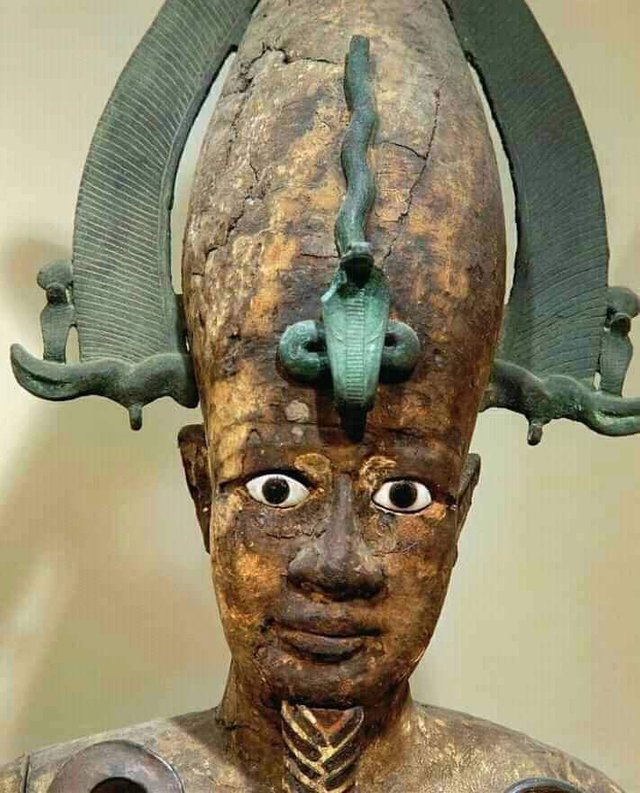Osiris

The Deeper You Dig, The Darker It Becomes
This is Osiris, the founder and the first king of Egypt. he was the one who brought his people into Egypt. he is the father of Horus, the brother of Seth, the brother and husband of Isis. the greeks took the Egyptian methodology and worshipped him by changing his name into Aupis(Hades). later the Romans adopted him as one of their gods, changed his name into Dionysus and made him the god of healing.
He is originally Ethiopian, he came from deep south of where the Nile river originated. the Greek historian Diodorus Siculus wrote this “The Ethiopians say that the Egyptians are settlers from among themselves and that Osiris was the leader of the settlement. The customs of the Egyptians, they say, are for the most part Ethiopian, the settlers having preserved their old traditions."
he further stated “They say also that the EGYPTIANS ARE COLONISTS SENT OUT BY THE ETHIOPIANS, Osiris having been the leader of the colony. For speaking generally, what is now Egypt, they maintain, was not land but sea when in the beginning the universe was being formed; afterwards, however?, as the Nile during the times of its inundation carried down the mud from Ethiopia, land was gradually built up from the deposit. Also the statement that all the land of the Egyptians is alluvial silt deposited by the river receives the clearest proof, in their opinion, from what takes place at the outlets of the Nile; for as each year new mud is continually gathered together at the mouths of the river, the sea is observed being thrust back by the deposited silt and the land receiving the increase. And the larger part of the customs of the Egyptians are, they hold, Ethiopian, the colonists still preserving their ancient manners”. he wrote this 2,000 years ago and it's is still happening. the Nile river still carries down muds from Ethiopia to Egypt. the Egyptian government sell these muds to some deserted Arabian countries. one of the reasons why Ethiopia has been building the dam is to stop the mud from going out anywhere."
he wrote this again, “Egypt itself was a colony of Ethiopia and the laws and script of both lands were naturally the same; but the hieroglyphic script was more widely known to the vulgar in Ethiopia than in Egypt”. Source: Diodorus Siculus, Bibliotheke Historica, or Library of History, bk. iii, ch. 3.)
the Ethiopians also know this. in the ancient Ethiopian books they mentioned this same history and said that the ancient Mizras(Egyptians) are their people sent out by their man, Ausis. by the way in Ethiopian history his name is ኦሲስ(Ausis), he is known as Ausis. one of the well known Ethiopia's historian and philosopher Professor Fikre Tolosa(PHD) said this in his book "the indigenous Egyptians were Ethiopians. Ausis was the leader of the migration, they followed Abay(Nile river) and finally settled there." the book is entitled "from Ethiopia to Egypt" it is not yet been translated into English. if anyone can read Amharic, i will indicate the book.
“The Egyptians are colonists sent out by the Ethiopians, Osiris having been the leader of the colony. . . . Osiris . . . . gathered together a great army, with the intention of visiting all the inhabited lands and teaching the race race of men how to cultivate . . . . for he supposed that if he made men give up their savagery and adopt a gentle manner of life he would receive immortal honors. . . . . They were the earliest, and say that the proofs of this are clear. That they did not arrive as immigrants but are the natives of the country and therefore rightly are called authochthonous is almost universally accepted. That those who live in the south are likely to be the first engendered by the earth is obvious to all . . . .They further write that it was among them that people were first taught to honor the gods and offer sacrifices and arrange processions and festivals and perform other things by which people honor the divine. For this reason their piety is famous among all men, and the sacrifes among the Ethiopians are believed to be particularly pleasing to the divinity.